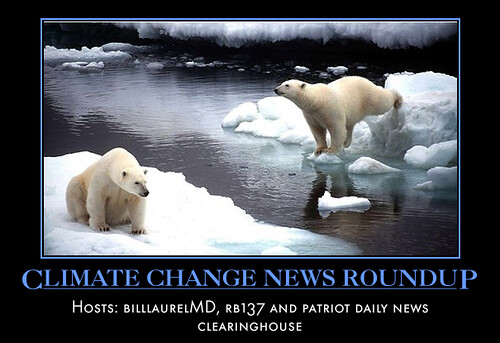Welcome to the Climate Change News Roundup for 13 March 2011. The political world wasn't the only thing in turmoil this week. It seems Gaia has been raising a ruckus as well, much to our detriment. Our thoughts are of course still with the people of Japan, as they struggle to recover from a series of major earthquakes and aftershocks, starting with an 8.9 (now 9.0) magnitude quake on Friday 11 March that set off a tsunami affecting much of the Pacific basin.
And speaking of the earthquake and tsunami ...
Apparently, the right is stating that we on the left are blaming the Japan magnitude 9.0 quake and tsunami on global warming. On Fox Nation website, we see
Some respond to Japan earthquake by pointing to global warming
the usual variation of "Some say..." to belittle the science behind global warming.
To wit: Fox Nation quotes a number of tweets on Twitter stating the opinion that the Japan earthquake and tsunami was a direct result of global warming. But anyone can tweet ... non-scientists who don't have the requisite knowledge to make such a statement can tweet. So can people who want to appear to be on the left making unscientific statements, to discredit scientists who have used science to show global warming is very likely occurring and is the result of human activities. Just sayin'.
But there was some inartful messaging in a blog post, from of all places, Grist. The original headline was "Today's tsunami: This is what climate change looks like", which was of course not the point of the post at all, beyond what the expected change in sea level might do over time (and also, how higher sea levels can make regions more vulnerable to things like tsunamis). He posted two addenda after some comments were made in response (Some of the comments were the typical right-wing rudeness, but some expressed valid concerns.). But of course, the damage has already been done. And that brings me to the point of this up-front diary before the Climate Change News Wrap-Up for this week ....
Be Careful What You Say, and How You Say It!
I've been immersing myself in reading information on the communication of science, that is: "How you say it." This is after attending a Union of Concerned Scientists (UCS) event at the American Association for the Advancement of Science (AAAS) annual meeting a few weeks ago on science communication with the media. After a light dinner, the press secretary for UCS, Aaron Huertas, did a nice presentation that connected how scientists can effectively communicate with the people who present our results for public consumption ... the science reporter.
The KISS principle (keep it simple, stupid, for those who don't know the acronym) was prominent. In an interview, stick to one or a few points that you want to communicate. Regardless of what happens, steer the conversation back to the point or points you want to come across. Consider the time pressures on the media to prepare a story, especially now when resources have been cut. Help journalists by creating sound bites that will accurately convey your work to the public. You'd also do well to develop good working relationships with science journalists (what few are left ... and that point was made as well). It's helpful to initiate contact with interested media to work with them as a subject matter expert on science matters, even before a specific issue comes up. Contacts can be made based on journalists' past stories on science news. And so on ... lots of practical advice, and good examples of how to, and how NOT to, communicate.
A good book by the UCS that contains this information is A Scientist's Guide to Talking with the Media, by Richard Hayes and Daniel Grossman. You can buy it here.
Lots of additional information can be found on the web. Here's a sample of them:
- The Center for Research on Environmental Decisions at Columbia University has an online version of their guide: The Psychology of Climate Change Communication: A Guide for Scientists, Journalists, Educators, Political Aides, and the Interested Public.
- Did you know there was a professional journal devoted to Science Communication? I didn't either, but it can be found here.
- An article in that same professional journal can be found hereentitled: Communicating Science: A review of the literature. It's 10 years old, but a cursory review of the content tells me it's still relevant.
- The George Mason University Center for Climate Change Communication
- Understanding your enemy: I cannot recommend enough the on-line book called The Authoritarians. While it's not explicitly about communication, it gives lots of insight on those who seem to be anti-science.
Enough about science communication ... how about communicating some global warming science and its consequences? See below.
